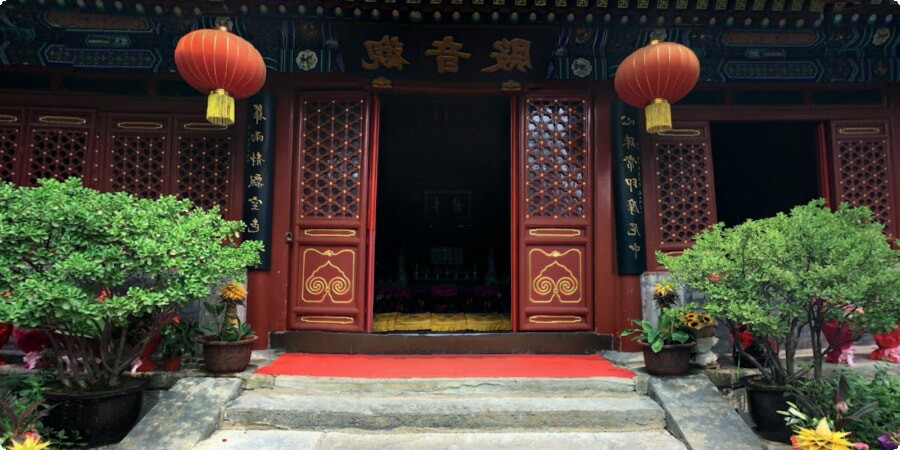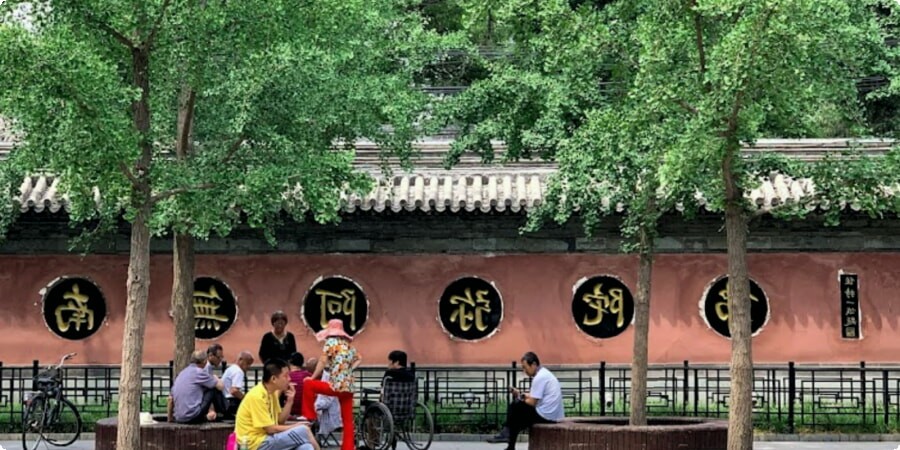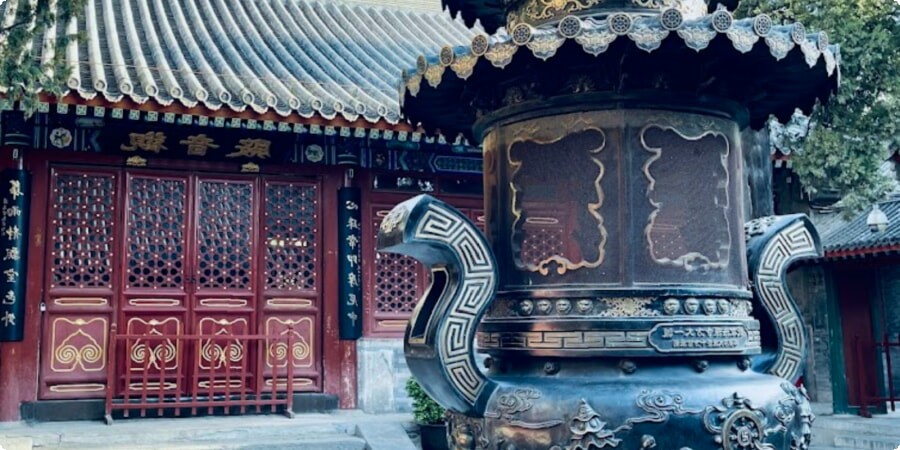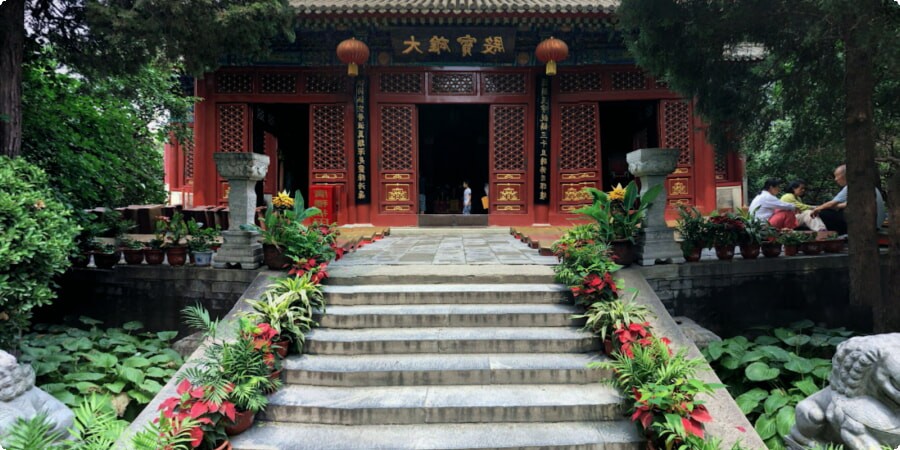A Spiritual Retreat: Finding Peace at Beijing’s Fayuan Temple
Nestled in the heart of Beijing’s historic district, Fayuan Temple stands as a serene oasis amid the bustling cityscape. Known as one of the oldest Buddhist temples in Beijing, Fayuan Temple offers a unique glimpse into China's spiritual and architectural heritage. Established during the Tang Dynasty (618–907 AD), this sacred site has been a center of Buddhist worship and cultural preservation for over a millennium. Its tranquil courtyards and ornate structures provide a peaceful retreat for both locals and visitors seeking a moment of calm and reflection in the midst of urban life.
For those planning a visit, Fayuan Temple is not just a site of historical interest but also a place where the teachings of Buddhism come to life. Its historical significance is deeply intertwined with the evolution of Buddhist practice in China, making it a must-visit destination for anyone interested in the rich tapestry of Chinese spirituality and culture.
Historical Significance and Origins
Fayuan Temple’s origins trace back to the Tang Dynasty, a period renowned for its flourishing culture and religious development. Founded in 645 AD by Emperor Taizong of Tang, the temple was originally established to commemorate the memory of his deceased mother. Over the centuries, Fayuan Temple has witnessed the rise and fall of dynasties, each leaving its mark on the temple’s architecture and cultural practices.
During the Yuan Dynasty (1271–1368 AD), the temple was rebuilt and expanded, reflecting the architectural styles of the era. The Ming (1368–1644 AD) and Qing (1644–1912 AD) dynasties also contributed to its development, adding intricate designs and embellishments that enhance its historical and artistic value. Today, Fayuan Temple stands as a testament to Beijing’s enduring Buddhist traditions and architectural evolution.
To explore more about the history of Fayuan Temple, you can visit the Wikipedia page on Fayuan Temple.

Architectural Features and Design
Fayuan Temple is celebrated for its classical Buddhist architecture, which showcases the intricate craftsmanship and design principles of ancient China. The temple’s layout follows traditional Chinese temple design, featuring a symmetrical arrangement of halls and courtyards that symbolize the harmony between heaven and earth.
The main hall, known as the Mahavira Hall, is the focal point of the temple and houses a revered statue of the Buddha. This hall is flanked by two smaller halls dedicated to various bodhisattvas and historical figures of Buddhism. The temple also boasts a series of pagodas, each adorned with delicate carvings and inscriptions that offer insights into Buddhist teachings and historical events.
Visitors will be captivated by the elegant eaves, intricately painted beams, and the serene beauty of the temple’s gardens. The design not only reflects the spiritual significance of the space but also creates an atmosphere of peace and contemplation. The balance and symmetry in the temple’s architecture invite visitors to pause and reflect, embodying the essence of Buddhist philosophy.
For a visual exploration of the temple’s architectural features, check out the Fayuan Temple on Google Maps.
The Spiritual Atmosphere
Stepping into Fayuan Temple is like entering a serene sanctuary away from the hectic pace of Beijing. The temple’s tranquil ambiance is a crucial part of its allure, offering a respite from the city’s noise and chaos. As you wander through its courtyards and halls, the calming presence of the temple invites reflection and spiritual connection.
The temple’s layout and design are meticulously crafted to enhance its spiritual atmosphere. The gentle sound of flowing water from the temple’s fountains, combined with the faint aroma of incense, creates a soothing environment conducive to meditation and contemplation. Visitors often find themselves drawn to the temple’s inner sanctum, where the sacred statues and artifacts serve as focal points for personal reflection and spiritual exploration.
The Fayuan Temple is also known for its Buddhist rituals and practices that take place throughout the day. These include chanting sessions, prayer offerings, and meditation practices, which are open to visitors seeking to participate in or observe traditional Buddhist practices. Whether you are a seasoned practitioner or a curious traveler, the temple offers an opportunity to experience the peaceful and contemplative side of Buddhism.
For those planning a visit, consider arranging your transportation in advance to ensure a smooth journey to this tranquil destination. You can book a car in China using this link for added convenience.

Notable Artifacts and Relics
Fayuan Temple is home to a remarkable collection of Buddhist artifacts and relics that highlight its historical and spiritual significance. Among its most treasured possessions are ancient statues, sacred scriptures, and intricate carvings that reflect the rich tapestry of Buddhist art and history.
One of the temple’s standout features is the large statue of the Buddha in the Mahavira Hall. This statue, revered by visitors and worshippers alike, embodies the essence of Buddhist teachings and serves as a central point for meditation and prayer. The temple also houses several smaller statues and relics, each with its own historical and spiritual significance.
Additionally, the temple's collection includes rare Buddhist scriptures and texts that provide insights into the evolution of Buddhist thought and practice in China. These manuscripts, carefully preserved over centuries, offer valuable historical context and contribute to the temple’s reputation as a center of Buddhist learning and culture.
To explore more about the artifacts and their historical context, you can visit the Wikipedia page on Buddhist Art.
Visitor Experience and Activities
Visiting Fayuan Temple is more than just a sightseeing experience; it is an opportunity to immerse yourself in a rich cultural and spiritual environment. The temple offers a range of activities and experiences designed to enhance your visit and deepen your understanding of Buddhist traditions.
Upon arrival, you can participate in guided tours that provide detailed explanations of the temple’s history, architecture, and spiritual practices. These tours are conducted by knowledgeable guides who can offer insights into the temple’s significance and answer any questions you may have.
For those interested in a more immersive experience, Fayuan Temple also offers meditation sessions and Buddhist ceremonies. These activities allow visitors to engage directly with the practices that have been a part of the temple for centuries. Additionally, the temple’s serene gardens provide a peaceful setting for quiet contemplation and reflection.
Whether you are seeking spiritual growth or simply wish to explore Beijing’s cultural heritage, Fayuan Temple offers a unique and enriching experience. Be sure to allocate enough time to fully appreciate the temple’s offerings and enjoy the peaceful surroundings.
If you need assistance with transportation during your visit, consider booking a car in advance to ensure a comfortable and hassle-free trip. You can find car rental options here.

Seasonal Highlights and Events
Fayuan Temple offers unique experiences throughout the year, with each season bringing its own charm and significance. Understanding these seasonal highlights can enhance your visit and provide deeper insights into the temple’s cultural and spiritual practices.
Spring: During spring, the temple's gardens come to life with blooming flowers and fresh greenery. This season is an ideal time to visit if you enjoy outdoor meditation and leisurely walks in a serene setting. The annual Buddha’s Birthday celebration, held in April or May, is a significant event, featuring special ceremonies and traditional rituals that attract both locals and tourists.
Summer: Summer at Fayuan Temple is marked by vibrant Buddhist festivals and events. The temple often hosts various cultural and spiritual activities, including Dharma talks and summer retreats. The warm weather also allows for extended outdoor activities, including yoga and meditation sessions in the temple's expansive courtyards.
Autumn: Autumn offers cooler temperatures and stunning fall foliage, making it a pleasant time for visitors. The temple’s autumn festival is a highlight, celebrating the harvest and expressing gratitude through traditional offerings and ceremonies. This season also provides a reflective atmosphere, perfect for personal meditation and contemplation.
Winter: Winter at Fayuan Temple is a tranquil and peaceful time. The quieter atmosphere allows for a more introspective experience. Special winter ceremonies and New Year celebrations are held, where visitors can participate in rituals to welcome the new year with spiritual intentions.
Nearby Attractions
While Fayuan Temple itself is a destination worth exploring, the surrounding area also offers several attractions that complement your visit. Exploring nearby sites can provide a fuller experience of Beijing’s rich cultural and historical landscape.
The Forbidden City: Just a short distance from Fayuan Temple, the Forbidden City is a must-visit for anyone interested in Chinese history and architecture. As the former imperial palace of the Ming and Qing dynasties, it is now a sprawling museum showcasing imperial artifacts and historical exhibitions.
Temple of Heaven: Another significant historical site nearby is the Temple of Heaven, renowned for its grand architecture and historical importance. It is a beautiful park and temple complex where emperors of the Ming and Qing dynasties performed annual rituals to ensure good harvests.
Beihai Park: This large public park is located a short distance from Fayuan Temple and features picturesque landscapes, historical pavilions, and serene lakes. It’s a great place for a leisurely stroll and to experience traditional Chinese garden design.

Practical Tips for Visitors
To make the most of your visit to Fayuan Temple, consider these practical tips to ensure a smooth and enjoyable experience:
Dress Appropriately: When visiting temples, it is important to dress modestly. Wear comfortable, respectful clothing that covers your shoulders and knees. This shows respect for the spiritual environment and the local customs.
Respect Local Customs: While at the temple, be mindful of the local customs and practices. Maintain a respectful demeanor, especially when participating in ceremonies or observing worshippers. Follow any instructions given by temple staff to ensure you are respectful of the sacred space.
Language and Communication: While many staff members and guides speak English, learning a few basic phrases in Mandarin can enhance your experience. Simple greetings and expressions of thanks can go a long way in connecting with locals and showing appreciation for their hospitality.
Travel Essentials: Bring essentials such as a water bottle, comfortable shoes for walking, and a hat or sunscreen if visiting during sunny weather. It’s also a good idea to carry a small amount of cash for donations or purchases at the temple’s gift shop.
Plan Your Transport: For a hassle-free visit, consider arranging your transportation in advance. You can book a car rental in China using this link to ensure a smooth journey to and from the temple.